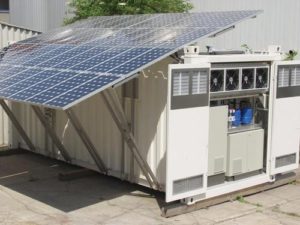India needs more solar-based cold storage units
Low cost manufacturing and negligible operating costs of solar powered cold storage facilities will increase the shelf life of the fruits and vegetables and make it affordable for many farmers in India.
Cold storage facility is the biggest need for farmers in the country. Every year due to poor warehouse conditions and failed cold chain transits, India wastes 40 pc of its harvested agricultural produce. According to the director of the National Horticulture Board, there is a 90 pc deficit of cold storage facilities in India.
Several institutions and organisations are coming up with innovative inventions to help the farmers with low cost and sustainable cold storage facilities that would help them increase the shelf life of their fruits and vegetables. A group of engineers at the Indian Agricultural Research Institute (IARI), New Delhi have developed a solar powered on-farm storage structure that can increase the shelf life of the fruits and vegetables where cold storage facilities are not present.
Designed by Pramod Kumar Sharma and others at IARI’s division of agricultural engineering, the device is a four-cubic-metre storage space that can retain the quality and freshness of the fruits and vegetables for an additional period of five days, as reported in the journal Current Science. It can be run with the help of only four solar photovoltaic panels. The engineers also use an inverter that converts DC type power generated by solar cells into AC type to keep the costs down. The device has a battery backup too. The structure of the cold storage has an exhaust fan on the roof of the container and is covered with commercially available cellulose pads on the four sides that are constantly fed with water using an underwater cooler pump.
This invention is a boon for farmers living in villages where grid electricity has not reached yet. Even though with Prime Minister Narendra Modi’s initiative of supplying electricity to all villages in India, there are many houses that are still in the dark. The low cost manufacturing and negligible operating costs of these cold storage facilities will make it affordable for many farmers.
According to the scientists, up to a third of fruits and vegetables produced in India perish in post harvest losses. Temperature and relative humidity are considered to be the most important environmental factors that influence the quality and storage life of fresh produce. If the surrounding temperature is brought down within four hours of harvesting, the scientists feel that it can slow down the deterioration of the quality and freshness of the produce. The device could not only lower the temperature at which the produce is kept but also increase the relative humidity, that helps to increase the shelf life of fruits and vegetables.
Another company called KOR Energy (India) Pvt. Ltd., a solar EPC company based in Noida, has decided to further its efforts to consolidate its solar energy business in the state of Uttar Pradesh.
KOR Energy is in the process of executing order ranging from 100KWp to 200KWp across 10 cold storage in the state of Haryana accumulating to 1.5MWp in total. Indian manufactured superior grade polycrystalline modules of Adani Solar and ABB inverters are being used in these plants to ensure maximum efficiency and performance consistency. These systems will be grid connected and will have an additional benefit of net metering, which will result in receiving credit in electricity bill against the excess electricity generated by the solar plant along with an online generation monitoring interface. KOR Energy has successfully installed Grid Connected Rooftop Solar Systems at three cold storage units in Haryana.
“We have successfully demonstrated the benefits of solar energy usage in cold chains and are now focusing on the promotion of green solar energy at these cold storage chains across India,” said Sushil Sarawgi, Director, KOR Energy India Pvt. Ltd.
The government is taking action and has approved 93 projects worth around INR 28.3 billion in calendar year 2017, compared to three projects with an investment commitment of nearly INR 0.6 billion the previous year, according to data compiled by Union Ministry of food processing. A recent study from CRISIL suggests the cold chain pie would double in five years. In January-February this year, 14 projects worth INR 3.3 billion have been approved. But even at this pace an estimated 30 pc of horticultural output is lost due to poor post-harvest management, lack of cold storage facilities and lack of connectivity between farmers and consumers.










